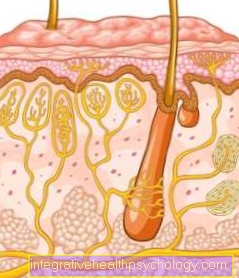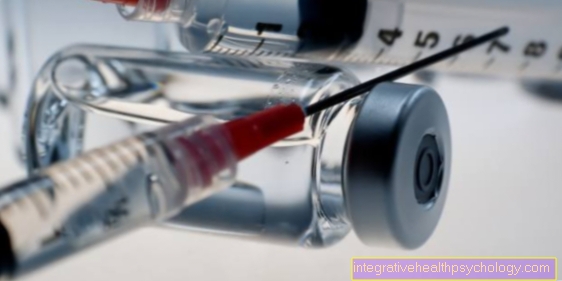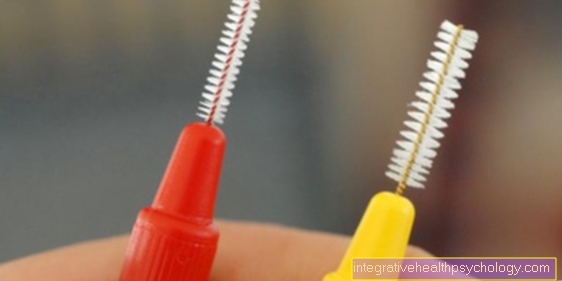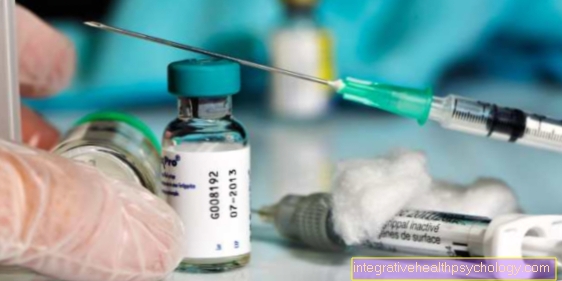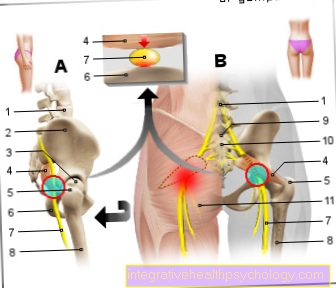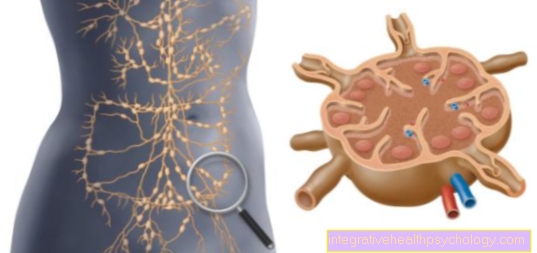Diagnosis of ADD
Synonyms in a broader sense
Attention Deficit Disorder, Attention Deficit Syndrome, Hans-peek-in-die-Luft, Psychoorganisches Syndrome (POS), Hyperkinetic Syndrome (HKS), Attention-Deficit-Disorder (ADD), minimal brain syndrome, behavioral disorder with attention and concentration disorder, Hans peek into die Air.
ADHD, attention deficit syndrome, fidgety philipp syndrome, fidgety philipp, attention deficit hyperactivity disorder, attention deficit hyperactivity disorder (ADHD), fidgety phil.

definition

In contrast to the Attention Deficit Hyperactivity Syndrome (ADHD) includes that Attention Deficit Syndrome (ADD) a possibly very pronounced inattentive but by no means impulsive or hyperactive behavior. ADD - children are often referred to as dreamers and often appear mentally absent. In extreme situations it gives the impression that the child's "body shell" is present, but nothing more!
In order not to make an incorrect diagnosis, thus not to designate all unfocused, “dreaming” children as ADD children, a so-called observation buffer / observation period has been placed before the actual diagnosis. Conspicuous symptoms that suggest ADD should have shown up over a period of about half a year in different areas of the child's life (kindergarten / school, at home, leisure time) and, above all, in a similar way. In the ICD 10 directory, the various types of ADD are listed under F90-F98, along with other behavioral and emotional disorders that begin in childhood and adolescence.
More recent studies on root cause research now assume that information is incorrectly passed on and processed between the two brain segments (hemispheres). On the parent ADS - Page you can learn more about the causes of ADS.
Even if dreaming and inattentiveness generally seem to signal disintegration in the subject, this does not mean that ADD children are generally not interested in the lesson. It does not necessarily mean that ADD children are less gifted, because they too can be gifted. Due to the fact that - due to the lack of concentration - knowledge gaps arise, problems in school areas can arise sooner or later. Often the problems relate to reading and spelling or arithmetic. A reading, spelling or arithmetic weakness are often the result.
In general, it cannot be ruled out that ADD children under one Partial disorder suffer from dyslexia or dyscalculia. Also others mental illness are conceivable and cannot be dismissed out of hand. Examples are: depressions, Tics, Tourette - syndrome, etc.
Summary
Children with attention deficit disorder fail Daydreams and inattention up and behave rarely impulsive. The ability to concentrate on work is therefore only given in phases in this form of ADS. As a rule, this lack of concentration leads to serious weaknesses in individual or several school areas. Attention-deficient children often suffer from one Reading and writing difficulties and / or one Arithmetic weakness.
In general, it is possible that an ADD child is also highly gifted. It is, however, much more difficult to do this Giftedness ascertain. One of the reasons for this is that one often does not trust a “dreaming” child to be gifted. A certain openness and knowledge of the symptoms of ADD is therefore required. In the context of ADD diagnostics, intelligence diagnostics is often the basis of diagnosis.
Just like a gifted can also Partial performance weaknesses (Dyslexia, dyscalculia) never rule out, so that under certain circumstances a diagnosis must also be made in this direction.
A therapy If ADD is diagnosed, it should always be tailored to the individual needs of the child. If possible, she should holistic and affect all areas of upbringing of the child. More information about the Therapy of ADD can be found on the corresponding page.
Similar to ADHD, an ADD child requires a lot of care, Affection and patience. Blaming and insulting children does not change behavior permanently and creates frustration on both sides. If consistent educational action as well as the establishment and adherence to agreed rules to some extent work, an initial hurdle has been overcome and the basis for further therapeutic action laid.
Interviewing the parents

As a rule, parents provide the most important caregivers of a child, whereby they play a central and important role with regard to a child's ability to observe. An observation of the child within the shelter “family” can give special information about the child's behavior. Again and again it is reported that parents do not find it particularly difficult to recognize norm differences, but that it is very difficult for them to admit observed behavior deviations. On the one hand, this is understandable, but one should be aware that these defense mechanisms do not help a child. The “blinkered thinking” in the form of: “This is already growing out” is in no case appropriate.
It is important to know that children who undoubtedly have ADD do not do so because parents may have made mistakes in their upbringing. ADD is not the result of a deficit in upbringing, even if it often appears, but it can be negatively influenced by it.
The acceptance of the problems is an important aspect - not only with regard to a more objective diagnostic assessment, but above all with regard to therapeutic success. Parents who accept the problem will probably also approach therapy more positively and can therefore help their child much better. And that's what it should be about in the end.
Diagnosis of ADD
In particular, diagnosing ADD is not easy. One of the reasons for this is that, due to the symptoms, ADD children do not necessarily have to attract negative behavior. Due to their daydreams and their frequent mental absence, they can be equated with shy children. On the part of the educators and also the teachers it requires an openness to this problem in a special way.
However, one should also warn against excessive anxiety, because not every quiet and absent child has ADD at the same time. In other words: ADD should not be used as an excuse for lack of drive or for being “stubborn” in certain stressful situations.
The diagnosis is also made more difficult by the fact that there are some symptoms that are typical of ADD, but the catalog of possible behavioral symptoms is never complete, and on the other hand, not every symptom necessarily has to appear. This is by no means a homogeneous disease (always occurring in the same way and with the same symptoms).
For this reason, precise observations in advance are essential. The observations must always relate to all areas of life (kindergarten / school, home environment, leisure time). The symptoms mentioned above can help to identify the first abnormalities. It is generally assumed that the symptom fields appear before school enrollment and that they appear regularly over a period of around six months. As mentioned above, the behavior can differ significantly from the respective stage of development.
Diagnostics should always be comprehensive and therefore cover the following areas:
- Questioning the parents
- Assessment of the situation by the school (Kiga)
- Preparation of a psychological report
- Clinical (medical) diagnostics
You might also be interested in: ADS test
Which doctor?
The first signs of an existing attention deficit disorder are often recognized by the pediatrician in charge. The visits to the doctor are particularly chaotic, for example, and the changed behavior of the children is evident in contact with the parents as well as with the doctor himself.
The pediatrician can then express his suspicion and hope that the parents will allow further examinations if there is justified suspicion. Even if ADD is a disease that Not can be traced back to a faulty upbringing or comparable circumstances, it is nevertheless negatively affected in society. Parents should make such a guess do not see it as an attack on yourself or your childbut the well-intentioned advice agree to further diagnostics. Only in this way does the child, if ADD actually exist, have the optimal prerequisites for targeted treatment.
If the suspected diagnosis is confirmed, the pediatrician can appoint a child and adolescent psychiatrist or a Psychologists consult. Often times it comes as part of the initial treatment to an inpatient admission of the young patients to a child and adolescent psychiatry in order to give them intensive care Dealing with their illness to train. In some cases, attention deficit disorder doesn't appear until the young adulthood recognized.
Read more about the topic here: ADD in adults
Often there is an additional psychiatric problem such as one Conduct disorder, one Anxiety or obsessive-compulsive disorder or one depression in front. Due to the problem at hand, the person presents to the psychiatrist, who can possibly also diagnose ADD.
In adulthood, psychiatrists and psychologists are involved in the treatment of the disease in the presence of attention deficit disorder.
The assessment of the situation by school / Kiga
Both kindergarten and (elementary) school offer themselves various possibilities for observation of a "suspicious" child. Both the educators and the teachers only speak Suspicious factsbut not the actual diagnosis. The assessment of the situation by the school (Kiga) is only one - albeit an important - part of a comprehensive survey.
Important observations, especially with regard to frustration tolerance, excessive or insufficient demands, but also problems in other areas, such as a Reading and writing difficulties or one Arithmetic weakness, should be recorded on an observation sheet. It seems important that all the educators or teachers who look after the child work together on the observation. However, it is also important to have a consistent and honest exchange with the parents and to talk to the school psychology service or the supervising therapist.
Preparation of a psychological report
There are different approaches, depending on the age of the child. While a so-called development diagnosis is carried out in preschool children, (elementary) school children are usually also subject to one Intelligence diagnostics. In both surveys, in addition to the actual observation criteria of a test procedure, particular attention is paid to how the child behaves in the test situation. If you would like to deal with the topic of intelligence and intelligence diagnostics in more detail, please click here: Giftedness.
Which diagnostic test procedures are used in each individual case varies. Well-known methods for measuring intelligence, development and partial performance disorders are for example: HAWIK (Hamburger Wechsler Intelligenztest für Kinder), the CFT (Culture Fair Intelligence Test) and many more.
The HAWIK tests practical, verbal and general intelligence using various sub-tests, such as: picture additions, general knowledge, arithmetic reasoning, etc.
The CFT measures a child's individual ability to recognize rules and identify certain characteristics. It also measures the extent to which the child is able to grasp and solve problems non-verbally. In total, the test consists of five different sub-tests,
In addition to the measurement of intelligence, which can also determine a possible giftedness, there are options for testing attention (e.g. DAT = Dortmund attention test), for measuring the ability to solve problems and for measuring the ability to concentrate.
Clinical (medical) diagnostics

It has already been mentioned that a diagnosis should consist of several moments of observation. This is important to avoid misdiagnosis, because many children are lively and curious or else calm and introverted without a “disorder” in the sense of ADD or ADHD. Parents, teachers or educators and psychologists therefore play an important role in making a suitable diagnosis, but do not issue it themselves. Issuing the diagnosis is the task of the pediatrician in Germany.
This has the consequence that - based on the observations - also targeted examinations be performed. These are usually of a neurological and internal nature. They all primarily aim to rule out organic problems as the cause of the abnormal behavior (= exclusion diagnostics).
As a rule, the pediatrician first arranges a comprehensive one Blood count (Exclusion of thyroid diseases, Iron deficiency, etc.) and also subjects the child to one physical exam (Exclusion of eye and ear diseases, allergies and their accompanying diseases (asthma, possibly Neurodermatitis; see: differential diagnostics). The children's U - examinations are often insufficient with regard to the precise examination of the sensory organs, especially the ears and eyes. More specific research is needed to rule out that the problems are due to the child simply seeing or hearing poorly. In both cases, problems in this area can prevent a child from concentrating and doing enough work. .
A EEG (E.lectroencephaloGramm) is used to determine potential fluctuations in the brain and enables conclusions to be drawn about possible functional disorders of the CNS (= central nervous system).
The EKG (E.lectrokardioGarmm) examines the heart rhythm and heart rate. Thus, in the context of ADD diagnostics, it serves more as a differential diagnostic measure to determine possible cardiac rhymus disorders which may require special medication or which do not enable ADD-typical medication. .
One possibility for recording an actual state from different perspectives is provided by the one named after its developer Achenbach scale. In addition to taking into account the age and gender of the child, the Achenbach scale offers the possibility of viewing the child's overall situation as objectively as possible through separate questionnaires for parents, educators / teachers and children. This always depends in a special way on the honesty of the people interviewed.
test
There is no special test for diagnosing ADD. The disorder is a diagnosis of exclusion: if all other possible causes can be ruled out, the diagnosis is ADD.In order to still be able to get an idea of the condition of the supposed patient, simple questionnaires are used. These include questions about attention (is it difficult to concentrate when something is important but not fun?), Mood (do you have frequent mood swings?), Criticism (can you handle it well when someone says something about you or Your work?), Impulsiveness (can you control yourself well if you are provoked?), Social behavior (do you often interrupt other people?) And many other points in everyday life. The questionnaire should always (if possible) be answered by the patient himself and by a close reference person (in most cases the parents). A comparison of the perception of others and of oneself can already provide initial indications of conspicuous behavior.
Differential diagnosis
The problem of diagnosing ADD is always that one automatically assigns supposed behaviors to these diseases. Many symptoms of ADD, such as the Poor concentration occur without such a syndrome being automatically underlying. At the same time, a lack of concentration can also indicate other clinical pictures, the symptoms of which are similar to ADD. Because of this, a differential diagnostic delimitation of symptoms required.
In particular pervasive developmental disorders, mood disorders, and a symptom-increasing home environment should - if possible in advance - be clarified through differential diagnosis.
As you can already see from the diagnosis (see above), it is especially the task of the doctor Metabolic disorders, visual and / or hearing disorders, neurological disorders investigate the cause and, if necessary, assign the cause of exhaustion. This includes, among other things Tourette syndrome, depressions, Anxiety disorders, mania, Compulsions, autism and bipolar disorders (= manic - depressive diseases)
In the cognitive field, a decreased intelligence, partial performance disorders like for example Dyslexia or Dyscalculia just as excluded as one Giftedness or one partial lack of concentration.
Other ADS topics
- ADS
- ADD causes
- ADD symptoms
- ADS diagnosis
- ADD therapy
- ADS curative education
- ADD psychotherapy
- Depth psychology
- Behavior therapy
- yoga
- Autogenic training
- ADD medication
- Methylphenidate
- Ritalin
- Antidepressants
- ADD diet
- ADs and family
- Educational games
Related topics
- ADHD
- Poor concentration
- Reading and spelling weaknesses / dyslexia
- Arithmetic weakness / dyscalculia
- Giftedness
A list of all the topics that we have published under our "Problems with Learning" page can be found at: Problems with learning A-Z




